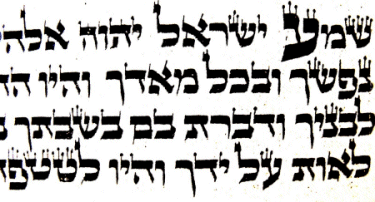|
ūöųĘūæų╝ų░ū©ų┤ūÖū¬ ūöųĘūÖų░ū®ūüųĖūĀųĖūö
|
|
ūöųĘūæų╝ų░ū©ų┤ūÖū¬ ūöųĘūŚų▓ūōųĖū®ūüųĖūö
|
|
First Covenant (Heb. 8:7, 9:1)
ūöųĘūæų╝ų░ū©ų┤ūÖū¬ ūöųĖū©ų┤ūÉū®ūüūĀųĖūö / ß╝Ī ŽĆŽüßĮĮŽä╬Ę ╬┤╬╣╬▒╬ĖßĮĄ╬║╬Ę
ha-brit ha-rishonah
|

|
Second Covenant (Heb. 8:7, 10:1-9)
ūæų╝ų░ū©ų┤ūÖū¬ ū®ūüųĄūĀų┤ūÖ / ╬┤╬╣╬▒╬ĖßĮĄ╬║╬Ę ╬┤╬ĄŽģŽäßĮ│Žü╬▒
brit sheni
|
|
Law of Moses (Acts 13:38-39)
ū¬ų╝ūĢų╣ū©ųĘū¬ ū×ū®ūüųČūö / ╬ĮßĮ╣╬╝╬┐Žģ ╬£ŽēŽģŽāß┐å
Torat Moshe
|

|
Law of Messiah (Gal. 6:2)
ū¬ų╝ūĢų╣ū©ųĘū¬ ūöųĘū×ų╝ųĖū®ūüų┤ūÖūŚųĘ / ŽäßĮĖ╬Į ╬ĮßĮ╣╬╝╬┐╬Į Žä╬┐ß┐” ╬¦Žü╬╣ŽāŽä╬┐ß┐”
Torat Ha-Mashiach
|
|
Mediated by Moses (John 1:17)
ūæų╝ų░ūÖųĘūōųŠū×ū®ūüųČūö / ╬┤╬╣ßĮ░ ╬£ŽēŽŗŽāßĮ│ŽēŽé
b'yad Moshe
|

|
Mediated by Yeshua (Heb. 8:6, 9:15)
ūæų╝ų░ūÖųĘūōųŠūÖųĄū®ūüūĢų╝ūóųĘ ūöųĘū×ų╝ųĖū®ūüų┤ūÖūŚųĘ / ╬┤╬╣ßĮ░ ߊĮ╬Ö╬ĘŽā╬┐ß┐” ╬¦Žü╬╣ŽāŽä╬┐ß┐”
b'yad Yeshua ha-Mashiach
|
|
Law of sin (Rom. 7:5-6)
ū¬ų╝ūĢų╣ū©ųĘū¬ ūöųĘūŚųĄūśų░ūÉ / ╬ĮßĮ╣╬╝╬┐Žé Žäß┐åŽé ß╝ü╬╝╬▒ŽüŽäßĮĘ╬▒Žé
Torat ha-chet
|

|
Law of righteousness (Rom. 9:30-31)
ū¬ūĢų╣ū©ųĘū¬ ūöųĘū”ų░ūōųĖū¦ųĖūö / ╬ĮßĮ╣╬╝╬┐Žé ╬┤╬╣╬║╬▒╬╣╬┐ŽāßĮ╗╬Į╬ĘŽé
Torat ha-tzedakah
|
|
Law of the flesh (Rom. 7:5-6)
ū¬ų╝ūĢų╣ū©ųĘū¬ ūöųĘūæų╝ųĖū®ūéųĖū© / ŽäßĮĖ╬Į ╬ĮßĮ╣╬╝╬┐╬Į Žäß┐ć Žā╬▒Žü╬║ßĮĄ
Torat ha-basar
|

|
Law of the Spirit (Rom. 8:2)
ū¬ų╝ūĢų╣ū©ųĘū¬ ū©ūĢų╝ūŚųĘ/ ╬ĮßĮ╣╬╝╬┐Žé Žä╬┐ß┐” ŽĆ╬Į╬ĄßĮ╗╬╝╬▒Žä╬┐Žé
Torat Ruach
|
|
Law of works (Rom. 3:27; Gal. 3:2)
ū×ųĘūóų▓ū®ūéųĄūÖ ūöųĘū¬ų╝ūĢų╣ū©ųĖūö / ß╝öŽü╬│╬▒ ╬ĮßĮ╣╬╝╬┐Žģ
ma'asei ha-Torah
|

|
Law of faith (Rom. 3:27; John 1:17)
ū¬ų╝ūĢų╣ū©ųĘū¬ ūöųĖūÉų▒ū×ūĢų╝ūĀųĖūö / ╬ĮßĮ╣╬╝╬┐Žé ŽĆßĮĘŽāŽä╬ĄŽēŽé
Torat ha-emunah
|
|
Yoke of bondage (Gal. 5:1)
ūæų╝ų░ūóū£ ūöųĖūóųĘūæų░ūōūĢų╝ū¬ / ╬ČŽģ╬│ß┐Ę ╬┤╬┐Žģ╬╗╬ĄßĮĘ╬▒Žé
b'ol ha'avdut
|

|
Law of liberty (James 1:25)
ū¬ų╝ūĢų╣ū©ųĘū¬ ūöųĘūŚųĄū©ūĢų╝ū¬ / ╬ĮßĮ╣╬╝╬┐Žé Žäß┐åŽé ß╝É╬╗╬ĄŽģ╬Ė╬ĄŽüßĮĘ╬▒Žé
Torat ha-cherut
|
|
Ended by Messiah (Rom. 10:4)
ūöųĘū×ų╝ųĖū®ūüų┤ūÖūŚųĘ ūĪūĢų╣ūŻ ūöųĘū¬ų╝ūĢų╣ū©ųĖūö / ŽäßĮ│╬╗╬┐Žé ╬ĮßĮ╣╬╝╬┐Žģ ╬¦Žü╬╣ŽāŽäßĮĖŽé
ha-Mashiach sof ha-Torah
|

|
Established by the Messiah
(Heb. 8:6, 10:9-10)
ūæų╝ų░ūżųĘūóųĘūØ ūÉųČūŚųĖū¬ / ß╝ÉŽåßĮ▒ŽĆ╬▒╬Š
b'pa'am echat
|
|
Law of Sin (Rom. 7:5, 8:2)
ū¬ų╝ūĢų╣ū©ųĘū¬ ūöųĘūŚųĄūśų░ūÉ / ╬ĮßĮ╣╬╝╬┐Žé Žäß┐åŽé ß╝ü╬╝╬▒ŽüŽäßĮĘ╬▒Žé
Torat ha-chet
|

|
Law of Life (Rom. 8:2, Gal. 3:11, 6:8)
ū¬ų╝ūĢų╣ū©ųĘū¬ ū©ūĢų╝ūŚųĘ ūöųĘūŚųĘūÖų╝ų┤ūÖūØ / ╬ĮßĮ╣╬╝╬┐Žé Žäß┐åŽé ╬ČŽēß┐åŽé
Torat ruach ha-chayim
|
|
A Shadow (Heb. 8:5; 10:1; Col. 2:17)
ū”ųĄū£ ūöųĘūśų╝ūæūĢų╣ū¬ / Žā╬║╬╣ßĮ▒
tzel ha-tovot
|

|
The true form (Heb. 10:1-18; Col. 2:17)
ūóųČū”ųČūØ ūöųĘūōų╝ų░ūæųĖū©ų┤ūÖūØ / ╬Ąß╝░╬║ßĮĮ╬Į, Žāß┐Č╬╝╬▒
etzem ha-devarim
|
|
Fulfilled (Matt. 5:17-18)
ū£ų░ū×ųĘū£ų╝ų░ūÉū¬ / ŽĆ╬╗╬ĘŽüß┐ČŽā╬▒╬╣
lemalot
|

|
In force (Heb. 8:6, 10:9; Matt 28:20)
ūæų╝ų░ūżųĘūóųĘūØ ūÉųČūŚųĖū¬ / ß╝ÉŽåßĮ▒ŽĆ╬▒╬Š
b'pa'am echat
|
|
Leaves unfinished (Heb. 7:19)
ū£ūÉųŠūöų┤ū®ūüų░ū£ų┤ūÖū×ųĖūö / ß╝ÉŽä╬Ą╬╗╬ĄßĮĘŽēŽā╬Ą╬Į
lo-hishlimah
|

|
Better Hope (Heb. 7:19)
ū¬ų┤ū¦ų░ūĢųĖūö ūśūĢų╣ūæųĖūö / ╬║Žü╬ĄßĮĘŽäŽä╬┐╬Į╬┐Žé ß╝É╬╗ŽĆßĮĘ╬┤╬┐Žé
tikvah tovah
|
|
Glorious (2 Cor. 3:7)
ūøų╝ųĖūæūĢų╣ūō / ╬┤ßĮ╣╬Š╬▒
kavod
|

|
More Glorious (2 Cor. 3:8-10)
ūÖųĖūĪųĘūŻ / ŽĆ╬ĄŽü╬╣ŽāŽā╬ĄßĮ╗Žē
yasaf
|
|
Remembers sins (Heb. 10:3)
ūÖųČū®ūüųŠū¢ųĄūøųČū© ū£ųĘūŚų▓ūśųĖūÉų┤ūÖūØ / ß╝Ć╬ĮßĮ▒╬╝╬Į╬ĘŽā╬╣Žé ß╝ü╬╝╬▒ŽüŽä╬╣ß┐Č╬Į
yesh-zacher la'chata'im
|

|
Forgets sins (Heb. 8:12, 10:17)
ū£ūÉ ūÉųČū¢ų░ūøų╝ųĖū©ųŠūóūĢų╣ūō / ╬┐ßĮÉ ╬╝ßĮ┤ ╬╝╬Į╬ĘŽā╬Ėß┐Č
lo ezkar-od
|
|
Many sacrifices (Heb. 9:12-13)
ū¢ų░ūæųĖūŚų┤ūÖūØ / ╬ĖŽģŽāßĮĘ╬▒Žé
zevachim
|

|
One Sacrifice (Heb. 10:12)
ū¢ųČūæųĘūŚ ūÉųČūŚųĖūō / ╬ĖŽģŽāßĮĘ╬▒╬Į ╬Ąß╝░Žé ŽäßĮĖ ╬┤╬╣╬Ę╬Į╬Ą╬║ßĮ▓Žé
zevach echad
|
|
Temporary priests (Heb. 7:23)
ūöųĘūøų╝ūöų▓ūĀų┤ūÖūØ / ╬┐ß╝▒ ß╝▒╬ĄŽü╬Ąß┐¢Žé
ha-kohanim
|

|
Eternal Priest (Heb. 7:17)
ūøų╝ūöųĄū¤ ū£ų░ūóūĢų╣ū£ųĖūØ / ß╝▒╬ĄŽü╬ĄßĮ║Žé ╬Ąß╝░Žé ŽäßĮĖ╬Į ╬▒ß╝░ß┐Č╬Į╬▒
kohen l'olam
|
|
Ineffective to save (Heb. 9:9, 10:4)
ū£ūÉ ūÖūĢų╝ūøųĘū£ / ╬╝ßĮ┤ ╬┤Žģ╬ĮßĮ▒╬╝╬Ą╬Į╬▒╬╣
lo yuchal
|

|
Eternal Redemption (Heb. 7:25)
ūÆų╝ų░ūÉūĢų╝ū£ų╝ųĘū¬ ūóūĢų╣ū£ųĖūØ / ╬▒ß╝░Žē╬ĮßĮĘ╬▒╬Į ╬╗ßĮ╗ŽäŽüŽēŽā╬╣╬Į
geulat olam
|
|
Yearly Atonement (Heb. 10:3)
ūÖūĢų╣ūØ ūøų╝ų┤ūżų╝ų╗ū©ų┤ūÖūØ / ß╝Ī╬╝ßĮ│Žü╬▒ ß╝É╬Š╬╣╬╗╬▒Žā╬╝╬┐ß┐”
yom kippurim
|

|
Eternal Atonement (Heb. 10:12-14)
ū¢ųČūæųĘūŚ ūÉųČūŚųĖūō / ╬ĖŽģŽāßĮĘ╬▒╬Į ╬Ąß╝░Žé ŽäßĮĖ ╬┤╬╣╬Ę╬Į╬Ą╬║ßĮ▓Žé
zevach echad
|
|
Priests have sin (Heb. 5:1-4)
ūöųĘūŚų▓ūśųĖūÉų┤ūÖūØ / ß╝ü╬╝╬▒ŽüŽäßĮĘ╬▒
ha-chataim
|

|
Sinless Priest (Heb. 7:26)
ūĀų┤ūæų░ūōų╝ųĖū£ ū×ų┤ū¤ųŠūöųĘūŚųĘūśų╝ųĖūÉų┤ūÖūØ / ╬║╬ĄŽćŽēŽü╬╣Žā╬╝ßĮ│╬Į╬┐Žé ß╝ĆŽĆßĮĖ Žäß┐Č╬Į ß╝ü╬╝╬▒ŽüŽäŽē╬╗ß┐Č╬Į
|
|
Aaronic priesthood (Heb. 7:11)
ūøų╝ų░ūöūĢų╝ūĀų╝ųĘū¬ ūæų╝ų░ūĀųĄūÖ ū£ųĄūĢų┤ūÖ / ╬ø╬ĄŽģ╬╣Žä╬╣╬║ß┐åŽé ß╝▒╬ĄŽüŽēŽāßĮ╗╬Į╬ĘŽé
kehunat b'nei Levi
|

|
Malki-Tzedek priesthood (Heb. 5:5-10, 7:21);
ū×ųĘū£ų░ūøų╝ų┤ūÖųŠū”ųČūōųČū¦ / ╬£╬Ą╬╗Žć╬╣ŽāßĮ│╬┤╬Ą╬║ (note that the Malki-Tzedek is the first priest in Torah).
|
|
Out of Levi (Heb. 7:11)
ūæų╝ų░ūĀųĄūÖ ū£ųĄūĢų┤ūÖ / ╬ø╬ĄŽģ╬╣Žä╬╣╬║ß┐åŽé ß╝▒╬ĄŽüŽēŽāßĮ╗╬Į╬ĘŽé
b'nei Levi
|

|
Out of Judah (Heb. 7:14)
ū×ų┤ūÖūöūĢų╝ūōųĖūö ū”ųĖū×ųĘūŚ / ß╝É╬Š ߊĮ╬Ö╬┐ßĮ╗╬┤╬▒
mi-Yehudah tzamach
|
|
Blood of goats and calves (Heb. 9:12)
ūæų░ūōųĘūØ ū®ūéų░ūóų┤ūÖū©ų┤ūÖūØ ūĢųĘūóų▓ūÆųĖū£ų┤ūÖūØ / ╬┤╬╣ߊĮ ╬▒ß╝Ą╬╝╬▒Žä╬┐Žé ŽäŽüßĮ▒╬│Žē╬Į ╬║╬▒ßĮČ ╬╝ßĮ╣ŽāŽćŽē╬Į
b'dam she'irim v'agalim
|

|
Blood of Messiah (Heb. 9:14-28)
ūōųĘūØ ūöųĘū×ų╝ųĖū®ūüų┤ūÖūŚųĘ / ŽäßĮĖ ╬▒ß╝Ę╬╝╬▒ Žä╬┐ß┐” ╬¦Žü╬╣ŽāŽä╬┐ß┐”
dam ha-Mashiach
|
|
Earthly Tabernacle (Heb. 9:2)
ūöųĘū×ų╝ų┤ū®ūüų░ūøų╝ųĖū¤ / Žā╬║╬Ę╬ĮßĮ┤
ha-Mishkan
|

|
Heavenly Tabernacle (Heb. 8:2)
ūöųĘū×ų╝ų┤ū®ūüų░ūøų╝ųĖū¤ ūöųĖūÉų▓ū×ų┤ū¬ų╝ų┤ūÖ / Žäß┐åŽé Žā╬║╬Ę╬Įß┐åŽé Žäß┐åŽé ß╝Ć╬╗╬Ę╬Ė╬╣╬Įß┐åŽé
ha-Mishkan ha'amiti
|
|
Imperfect mediator (Gal. 3:19)
ūÉų┤ūÖū®ūü ūöųĘūæų╝ųĄūĀųĖūÖų┤ūØ / ╬╝╬ĄŽāßĮĘŽä╬ĘŽé
ish ha-banim
|

|
Sinless Mediator (1 Tim. 2:5)
ū×ųĄū£ų┤ūÖūź ūÉųČūŚųĖūō / ╬Ąß╝ĘŽé ╬╝╬ĄŽāßĮĘŽä╬ĘŽé
melitz echad
|
|
No inheritance (Rom. 4:13)
ūøų╝ų┤ūÖ ū£ūÉ ūóųĘū£ųŠūÖų░ūōųĄūÖ ū¬ūĢų╣ū©ųĖūö / ╬¤ ╬┤╬╣ßĮ░ ╬ĮßĮ╣╬╝╬┐Žģ ß╝Ī ß╝ÉŽĆ╬▒╬│╬│╬Ą╬╗ßĮĘ╬▒
ki lo al-yad Torah...
|

|
Eternal inheritance (Heb. 9:15)
ūĀųĘūŚų▓ū£ųĘū¬ ūóūĢų╣ū£ųĖūØ / ╬▒ß╝░ßĮĮ╬Į╬╣╬▒ ╬║╬╗╬ĘŽü╬┐╬Į╬┐╬╝ßĮĘ╬▒Žé
nachalat olam
|
|
Animal blood (Heb. 9:16-22)
ūæų░ūōųĘūØ ū®ūéų░ūóų┤ūÖū©ų┤ūÖūØ ūĢųĘūóų▓ūÆųĖū£ų┤ūÖūØ / ╬┤╬╣ߊĮ ╬▒ß╝Ą╬╝╬▒Žä╬┐Žé ŽäŽüßĮ▒╬│Žē╬Į ╬║╬▒ßĮČ ╬╝ßĮ╣ŽāŽćŽē╬Į
b'dam she'irim v'agalim
|

|
Blood of Messiah (Eph. 2:13; Heb. 9:14; 1 Pet. 1:18-19; 1 John 1:7, etc.)
ūōųĘūØ ūöųĘū×ų╝ųĖū®ūüų┤ūÖūŚųĘ / ŽäßĮĖ ╬▒ß╝Ę╬╝╬▒ Žä╬┐ß┐” ╬¦Žü╬╣ŽāŽä╬┐ß┐”
dam ha-Mashiach
|
|
Produces wrath (Rom. 4:15)
"the Torah brings wrath"
ū×ų┤ūżų╝ų░ūÉųĘū¬ ūöųĘū¬ų╝ūĢų╣ū©ųĖūö ūÖųĄū”ųĄūÉ ūöųĘū¦ų╝ųĖū”ųČūŻ
ßĮü ╬ĮßĮ╣╬╝╬┐Žé ßĮĆŽü╬│ßĮ┤╬Į ╬║╬▒Žä╬ĄŽü╬│ßĮ▒╬Č╬ĄŽä╬▒╬╣
|

|
Saves from wrath (Rom. 5:9)
ū®ūüųČūĀų╝ų┤ūĢų╝ųĖū®ūüųĘūó ūæų╝ūĢų╣ ū×ų┤ū¤ųŠūöųĘū¦ų╝ųĖū”ųČūŻ
ŽāŽē╬Ė╬ĘŽāßĮ╣╬╝╬Ą╬Ė╬▒ ╬┤╬╣ߊĮ ╬▒ßĮÉŽä╬┐ß┐” ß╝ĆŽĆßĮĖ Žäß┐åŽé ßĮĆŽü╬│ß┐åŽé
|
|
Incapable of Redemption (Heb. 10:4)
ū£ūÉ ūÖūĢų╝ūøųĘū£ ū£ų░ūöųĖūĪų┤ūÖū© ūŚų▓ūśųĖūÉų┤ūÖūØ / ß╝Ć╬┤ßĮ╗╬Į╬▒Žä╬┐Žé
lo yuchal l'chasir chataim
|

|
Redeems (Gal. 3:13, Heb. 9:12-15)
ūÆų╝ų░ūÉūĢų╝ū£ų╝ųĘū¬ ūóūĢų╣ū£ųĖūØ / ╬▒ß╝░Žē╬ĮßĮĘ╬▒╬Į ╬╗ßĮ╗ŽäŽüŽēŽā╬╣╬Į
geulat olam
|
|
Non-pleasing (Psalm 40:6)
ū£ūÉųŠūŚųĖūżųĘū”ų░ū¬ų╝ųĖ
lo-chofatzta
|

|
Pleasing to God (Heb. 10:5-18)
ūśūĢų╣ūæ ūÉųČū£ųŠūÖų░ūöūĢųĖūö / ╬ĄßĮÉßĮ▒Žü╬ĄŽāŽä╬┐╬Į Žäß┐Ę ╬Ė╬Ąß┐Ę
tov el-Adonai
|
|
Abolishment predicted (Jer. 31:33)
ūöų┤ūĀų╝ųĄūö ūÖųĖū×ų┤ūÖūØ ūæų╝ųĖūÉų┤ūÖūØ ... ūæų╝ų░ū©ų┤ūÖū¬ ūŚų▓ūōųĖū®ūüųĖūö
hinei yamim ba'im... brit chadasha
|

|
Establishment predicted (Heb. 8:13)
ūÖų┤ū®ų╝ūüųĄū¤ ūÉųČū¬ųŠūöųĖū©ų┤ūÉū®ūüūĢų╣ūĀųĖūö
yishen et-ha-rishonah
|
|
Circumcision in flesh (Gen. 17:11)
ūĀų░ū×ųĘū£ų░ū¬ų╝ųČūØ ūÉųĄū¬ ūæų╝ų░ū®ūéųĘū© ūóųĖū©ų░ū£ųĘū¬ų░ūøųČūØ
nemaltem et basar arlatkhem
|

|
...of the heart (Rom. 4:9-12; Col. 2:11)
ū×ų┤ūÖū£ųĘū¬ ūöųĘū×ų╝ųĖū®ūüų┤ūÖūŚųĘ / ŽĆ╬ĄŽü╬╣Žä╬┐╬╝ßĮĄ Žä╬┐ß┐” ╬¦Žü╬╣ŽāŽä╬┐ß┐”
milat ha-mashiach
|
|
Made to change (Heb. 7:12, Gal. 3:25)
ū¬ų╝ų┤ū®ūüų░ū¬ų╝ųĘūĀų╝ųČūö ūöųĘū¬ų╝ūĢų╣ū©ųĖūö / ╬ĮßĮ╣╬╝╬┐Žģ ╬╝╬ĄŽäßĮ▒╬Ė╬ĄŽā╬╣Žé ╬│ßĮĘ╬Į╬ĄŽä╬▒╬╣
tishtaneh ha-Torah
|

|
Made eternal (Heb. 13:20)
ūæų╝ūōųĘūØ ūæų╝ų░ū©ų┤ūÖū¬ ūóūĢų╣ū£ųĖūØ / ß╝É╬Į ╬▒ß╝Ą╬╝╬▒Žä╬╣ ╬┤╬╣╬▒╬ĖßĮĄ╬║╬ĘŽé ╬▒ß╝░Žē╬ĮßĮĘ╬┐Žģ
b'dam brit olam
|
|
Faulty (Heb. 8:7)
ū£ūÉ ūÆų╝ų░ū×ūĢų╝ū©ųĖūö / ╬┐ßĮÉ╬║ ß╝ä╬╝╬Ą╬╝ŽĆŽä╬┐Žé
lo gemurah
|

|
Perfect (James 1:25)
ūöųĘū¬ų╝ūĢų╣ū©ųĖūö ūöųĘū®ų╝ūüų░ū£ųĄū×ųĖūö / ╬ĮßĮ╣╬╝╬┐Žé ŽäßĮ│╬╗╬Ą╬╣╬┐Žé
ha-Torah hashelmah
|
|
Weak (Heb. 7:18)
ūŚų╗ū£ų░ū®ūüųĖūö / ß╝ĆŽā╬Ė╬Ą╬ĮßĮĄŽé
chalushah / chalash
|

|
Strong (Heb. 7:25)
ūŚųĖū¢ųĖū¦ / ß╝É╬Į╬ĄŽü╬│ßĮĄŽé
chazak
|
|
Needs Reform (Heb. 9:10-14)
ūóųĘūōųŠūóųĄū¬ ūöųĘū¬ų╝ų┤ū¦ų╝ūĢų╝ū¤ / ╬┤╬╣ßĮ╣Žü╬ĖŽēŽā╬╣Žé
ad-et ha-tikkun
|

|
Spiritual program (2 Cor. 3:6, 18)
ūöųĖū©ūĢų╝ūŚųĘ ū×ų░ūŚųĘūÖų╝ųČūö / ŽäßĮĖ ŽĆ╬Į╬Ąß┐”╬╝╬▒ ╬Čß┐│╬┐ŽĆ╬┐╬╣╬Ą╬╣
ha-ruach yechayeh
|
|
Ministry of death (2 Cor. 3:7)
ūöųĘūøų╝ų░ūöų╗ūĀų╝ųĖūö ūÉų▓ū®ūüųČū© ū×ųĖūĢųČū¬ ūæų╝ųĖūöų╝ / ß╝Ī ╬┤╬╣╬▒╬║╬┐╬ĮßĮĘ╬▒ Žä╬┐ß┐” ╬Ė╬▒╬ĮßĮ▒Žä╬┐Žģ
ha-kehunah asher mavet bah
|

|
Ministry of reconciliation (2 Cor. 5:18)
ūóų▓ūæūōųĘū¬ ūöųĘūĪų╝ų░ū£ų┤ūÖūŚųĖūö / ß╝Ī ╬┤╬╣╬▒╬║╬┐╬ĮßĮĘ╬▒ Žäß┐åŽé ╬║╬▒Žä╬▒╬╗╬╗╬▒╬│ß┐åŽé
avodat ha-selichah
|
|
Daily program (Heb. 7:27)
|

|
Finished program (Heb. 10:10-18)
|
|
Frail high priests (Heb. 5:2, 7:28)
|

|
Perfect High Priest (Heb. 7:26)
|
|
Made priests by law (Heb. 7:12, 28)
|

|
Made Priest by an oath (Heb. 7:21, 28)
|
|
No salvation (Heb. 10:2-4)
|

|
Eternal salvation (Heb. 5:9, 10:10)
|
|
Perfected nothing (Heb. 7:19)
|

|
Perfects believers (Heb. 7:19, 10:14)
|
|
Earthly priests (Heb. 5:1-4)
|

|
Heavenly Priest (Heb. 9:24, 10:12)
|
|
Repeated inability (Heb. 10:11)
|

|
Glorious success (Heb. 10:10-18)
|
|
Many offerings (Heb. 9:7)
|

|
One Offering (Heb. 10:10-14)
|
|
Good promises (Deut. 28:1-14)
|

|
Better promises (Heb. 8:6)
|
|
A good covenant (Rom. 7:12)
|

|
A better covenant (Heb. 7:22, 8:6)
|
|
Many high priests (Heb. 7:23)
|

|
One High Priest (Heb. 7:24-28)
|
|
Symbolic Tabernacle (Heb. 9)
|

|
True Tabernacle (Heb. 8:2, 9:11)
|
|
No mercy (Heb. 10:28)
|

|
Complete mercy (Heb. 8:12)
|
|
Handmade things (Heb. 9:1-5, 24)
|

|
Heavenly things (Heb. 9:23-24)
|
|
An old way (Heb. 8:13)
|

|
New and living way (Heb. 10:19-20)
|
|
Unavailing ministers (Heb. 7:18)
|

|
Able ministers (2 Cor. 3:6)
|
|
Carnal ministry (Heb. 9:9-10)
|

|
Spiritual ministry (2 Cor. 3:6)
|
|
Ministry of condemnation (2 Cor. 3:9)
|

|
Ministry of righteousness (2 Cor. 3:9)
|
|
Glory covered (2 Cor. 3:13)
|

|
Glory revealed (2 Cor. 3:18)
|
|
Brings bondage (Gal. 4:24-25)
|

|
Brings liberty (2 Cor. 3:17)
|
|
Cannot justify (Gal. 2:16)
|

|
Does justify (Acts 13:38-39)
|
|
Brings a curse (Gal. 3:10)
|

|
Redeems from the curse (Gal. 3:13)
|
|
Life by works (Gal. 3:10)
|

|
Life by trust (Gal. 3:11)
|
|
Cannot give life (Gal. 3:21)
|

|
Life-giving (John 6:63-68)
|
|
Exposes sin (Gal. 3:19)
|

|
Covers sin (Rom. 4:1-8)
|
|
Under law (Rom. 6:14-15)
|

|
Under grace (Gal. 3:22-25)
|
|
Done away (2 Cor. 3:7-14)
|

|
Not done away (2 Cor. 3:11)
|
|
Abolished (2 Cor. 3:13)
|

|
Continues glorious (2 Cor. 3:11)
|


